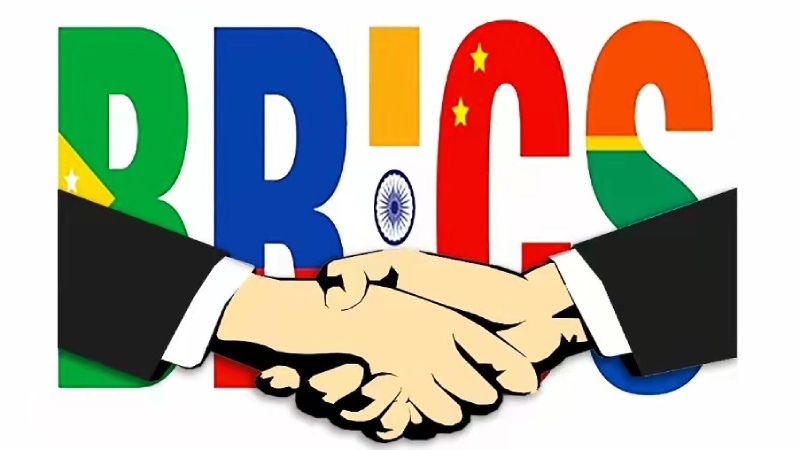World
BRICS: 5 Things to Know about Malaysia’s and Thailand’s Interest in BRICS Membership

As middle-power countries try to maneuver amid growing geopolitical uncertainties, including the tensions between the United States and China, two Southeast Asian countries, Malaysia and Thailand, have recently revealed their plans to join the BRICS grouping of emerging countries.
What would their BRICS membership mean? Will their neighbors follow? Here are five things to know:
What kind of organization is BRICS?
BRICS, which stands for Brazil, Russia, India, China, and South Africa, was first introduced in 2009 under the name BRIC. After South Africa joined the group in 2010, the name was changed to BRICS. Its formation aimed to promote cultural, political, and economic cooperation amongst its constituents.
As an informal group that meets annually to allow for flexibility and quick responses to global challenges, the group functions without a formal charter or secretariat, in contrast to the Association of Southeast Asian Nations (ASEAN).
In an article published on the East Asia Forum, Alicia Garcia-Herrero, a senior research fellow at the Brussels-based think tank Bruegel, contended that China dominated the bloc during the group’s formation and that the majority of the trade growth has been focused on China. The group has “experienced an acceleration in economic growth” as a result of the recent increase, which is primarily the result of India.
Compared to the developed nations of the Group of Seven (G7), which had a combined GDP of $46.8 trillion, the five countries’ combined GDP last year was $25.8 trillion, or nearly 25% of the global total.
Why do Malaysia and Thailand want to join?
Taking part in BRICS would promote trade and investment as well as economic cooperation between peer emerging economies.
Additionally, Hoo Chiew Ping, a senior fellow at the East Asian International Relations Caucus, states that Malaysia sees this as a chance to participate in growing multilateralism. She stated that joining BRICS would “[support] a multipolar world order rather than being drawn into a new Cold War centered on the U.S.-China rivalry.”
According to Thailand, being a member of BRICS would strengthen its position as a leader among developing nations.
Being a BRICS member does not imply that Thailand is taking sides, a spokesman for the foreign ministry told reporters last week. The country wants to “play more roles, promoting Thai potentials to co-play the roles with developed nations and underdeveloped nations to provide guidelines for global community development to promote justice and equality.”
Will other countries in Southeast Asia follow?
Retno Marsudi, Indonesia’s foreign minister, stated earlier this year that Jakarta was still assessing the advantages of joining BRICS. This comes after August of last year when President Joko “Jokowi” Widodo attended the BRICS summit in South Africa and called for increased developing country collaboration to combat “trade discrimination.”
After the event, Jokowi told reporters that although Indonesia has strong economic ties with other members of the group, “we don’t want to rush” joining the bloc.
According to observers, Indonesia’s hesitation to become a member of BRICS stems from a desire to avoid being perceived as being too close to China, which has become its largest trading partner and source of foreign direct investment in recent years. For the previous decade, China has been the majority of ASEAN countries’ largest trading partner.
In the meantime, Indonesia is hoping to become a member of the OECD. To become the first country from Southeast Asia to join the OECD, Indonesia had to start accession talks with the rich-country club in February.
Indonesia will be inspired to revive its BRICS plans by Malaysia’s and Thailand’s actions, according to Rahul Mishra, an associate professor at Jawaharlal Nehru University’s Center for Indo-Pacific Studies. “Vietnam could be the next member, and a bigger BRICS would mean a collective of more voices from the Global South,” he continued.
This month, Vietnam sent a delegation to the BRICS Dialogue with Developing Countries in Nizhny Novgorod, Russia. While keeping an eye on the BRICS expansion, the nation has not made any comments on joining the bloc. Laos and Thailand were also present at the forum.
What would Thailand’s and Malaysia’s BRICS memberships mean for Southeast Asia?
The change may put pressure on the cohesion and importance of ASEAN, the region’s own multilateral framework, and experts warn that the bloc must change to stay relevant as its members consider joining other alliances.
Fikry A. Rahman, the head of foreign affairs at Malaysia’s research institute Bait Al-Amanah, stated, “It is high time for ASEAN to prepare the necessary, to complement the appetite of its member states in bolstering action and crafting solutions, in which ASEAN seems to be counterproductive.”
While pointing out that the Southeast Asian bloc’s nature limits its role in advancing regional goals, Fikry stated that ASEAN will continue to take center stage for Southeast Asia and that its members will not compromise its values.
What does a bigger BRICS mean for the world?
The Global South’s voice would be amplified by the BRICS expansion, which would also indicate further division in the increasingly divided world.
The Global South’s more well-known nations, Egypt, Ethiopia, Iran, and the United Arab Emirates (UAE), joined BRICS in January 2024, and more countries may join in the future.
As Hoo pointed out, middle powers maneuver amid tensions between superpowers. “The expanded BRICS membership is a direct response to heightened bipolar rivalry, which has significantly increased global geopolitical uncertainties,” Hoo said.
However, Hoo issued a warning, pointing out that the addition of more nations could send a problematic signal to the United States and its allies because membership can be seen as hostile to Western interests and values, particularly given Russia’s involvement in the organization.
-

 Business3 weeks ago
Business3 weeks agoNayef Doleh Examines International Humanitarian Fundraising Strategies
-

 Business3 weeks ago
Business3 weeks agoHow to fill MSME Form 1? Step-by-Step Guide
-

 Business4 weeks ago
Business4 weeks agoHow Black Banx is Redefining Global Banking Strategies in 2025
-

 Education4 weeks ago
Education4 weeks agoSchool Of Odd Thinkers – Think Odd, Learn a lot, and Earn a lot
-

 Festivals & Events3 weeks ago
Festivals & Events3 weeks agoInteresting Facts about St. Patrick’s Day
-

 Education4 weeks ago
Education4 weeks agoJeffrey Laino Offers a Close Look at Literary Analysis Implementation
-

 Tech4 weeks ago
Tech4 weeks agoMicrosoft Teams to End SMS Messaging Feature Support for Android Phones and Switch to Phone Link App as Alternative
-
Business3 weeks ago
From Marine to Chief: The Leadership Journey of Sean Mannix















